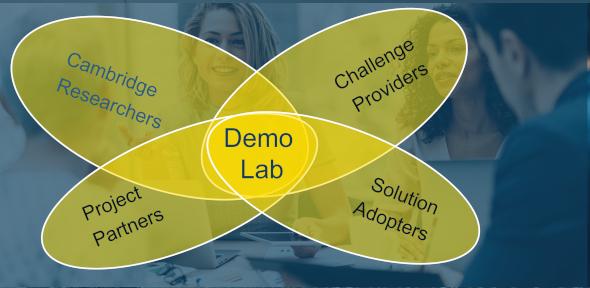
Barriers to address:
The Climate Emergency demands solutions ready to be delivered promptly and at scale in response to, and matched against, well-defined challenges. Climate change affects everyone, time is running out, and yet few have found ways to engage meaningfully with the issue.
R&D timescale:
Research outcomes, in particular across science and technology, require years of development until a ready product roll-out can begin. New approaches to objective triaging and trialling of solutions are urgently needed, orchestrating and catalysing joined up efforts of all stakeholders in the idea-to-product full development cycle.
Resourcing:
Space and funding for quick, targeted challenge-led (rather than technology push) sustainability-focussed projects is scarce – academia favours extensive research programmes. While such programmes recruit researchers who could apply their skills more broadly to create impact on climate solutions, the time required to do so outside of regular work commitments is in short supply. Relying only on researchers able to volunteer their spare time leads to poor diversity and exclusion. Quality outputs require sufficient undivided attention/time commitment. yet not everyone can work after hours, or afford to work without pay, despite high levels of interest and a desire to apply their expertise in furthering climate solutions.
Skills:
University researchers accumulate deep expertise, becoming domain experts, but rarely prepare for effective engagement with non-academic groups. There are very few opportunities for postdocs to put research, knowledge-gathering and critical thinking skills to practical use beyond their current research projects.
Opportunities to capitalise on:
People are the University’s main asset and the source of its success. Driven, motivated and highly skilled teams can stratify and accelerate development of climate solutions, especially when provided with the right environment and sufficient ring-fenced time.
Sprintshop projects require prioritisation, targeted deployment of limited resources, complementary expertise and concentrated effort injection to succeed, but they can add significant critical momentum to a promising idea. We can think of it like a consultancy relay race: everyone contributes with their strengths and full effort during a concentrated, well-defined period of time, driven forward by previous training, supporters and healthy competition, and the team jointly delivers the baton across the finish line (or passes on to the following runner at full momentum). Scale of commitment is agreed upfront, team skills and magnitude of opportunities will drive selection of the challenges and prospective solutions to focus on, with time reserved at the start of the project to carefully consider various options and select what to work on.

